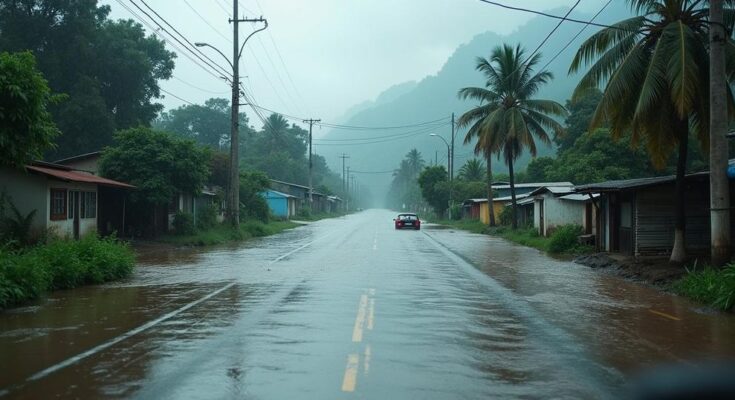Torrential rains have led to severe flooding across West and Central Africa, particularly devastating northeastern Nigeria. The floods have displaced over 400,000 people and resulted in more than 1,000 fatalities this year. Affected regions include Chad, Nigeria, Mali, and Niger, with victims expressing a dire need for assistance amid ongoing rescue efforts and a significant humanitarian crisis exacerbated by climatic changes.
Severe flooding continues to devastate northeastern Nigeria amidst torrential rains that have swept through West and Central Africa, severely impacting over 400,000 individuals, as reported by the United Nations. Aerial views illustrate the extent of the flooding, which has led to the displacement of countless residents. In Maiduguri, where a dam collapse exacerbated the situation, the ramifications have been catastrophic. The landscape of the city is unrecognizable, with homes destroyed and inmates escaping from a compromised prison as floodwaters rose. The floods have claimed over 1,000 lives this year alone throughout the region, particularly affecting Chad, Nigeria, Mali, and Niger. To this point, more than four million individuals in West Africa have been affected, a significant increase compared to the previous year. Rescue operations are ongoing, but the death toll is challenging to determine conclusively. Preliminary reports have indicated at least 230 fatalities in Nigeria, 265 in Niger, 487 in Chad, and 55 in Mali, which is currently experiencing its worst flooding crisis since the 1960s. The World Meteorological Organization has noted that Africa accounts for a minimal share of global greenhouse gas emissions, yet the continent remains one of the most susceptible regions to extreme weather events. It is estimated that adapting to such conditions may cost between $30 billion and $50 billion annually over the next decade, with potential impacts on up to 118 million Africans by 2030. Owing to the prolonged conflict with Boko Haram insurgents, Maiduguri has faced immense challenges over the past decade. Local resident Saleh Bukar shared a vivid account of the panic that ensued as floodwaters began to rise: “Water is flooding everywhere!” he recalled, emphasizing the urgency and chaos of the situation. Many residents were caught unprepared, resulting in tragic losses. Local authorities are overwhelmed, with the United Nations reporting that more than 600,000 individuals in Borno state have been displaced due to the floods, with at least 100 fatalities and 58 injuries in the recent crisis. Harrowing stories from survivors illustrate the devastation: Aishatu Ba’agana described her desperate plea for help to save her newborn amidst the surging waters, voicing concerns for her family now missing. The floods have also caused significant damage to infrastructure, leading to the failure of critical dikes and the inundation of major roads. Governor Babagana Zulum has appealed for international assistance, as local resources are stretched thin. The World Food Program has begun providing essential food and assistance to those affected, while USAID has allocated over $3 million in humanitarian aid to the region. However, many individuals feel abandoned amid the disaster, relying on community support to survive. Harira Adamou, a single mother of six, lamented the destruction of her home and the lack of state aid in Niger, citing the risks associated with residing in a mud structure. As conditions remain precarious, with 15% of Maiduguri still underwater and increased rainfall forecasted, many residents are anxious about future storms. Bukar, a local volunteer, has actively participated in helping others amidst the catastrophe, despite being a victim himself. “Our people need us. They need help,” he emphasized, demonstrating the resilience and solidarity of the affected communities. The flooding in West Africa presents a multifaceted crisis, with humanitarian needs spiking and resilient communities grappling with nature’s fury in a region already burdened by conflict and economic hardships.
The devastating floods in West and Central Africa have primarily impacted regions that are already vulnerable due to humanitarian crises, exacerbated by ongoing conflict, such as in Borno state, Nigeria. The recent torrential rains have led to the most severe floods experienced in decades across several countries, resulting not only in loss of life but also widespread displacement and destruction of vital infrastructure. According to the U.N., the situation underscores the need for significant international assistance as local capacity is overwhelmed and many communities struggle to cope with the aftermath of this disaster.
In summary, the floods in West and Central Africa constitute a grave humanitarian crisis, significantly affecting the lives of millions and calling into question the capacity of local authorities to respond. With already strained conditions due to conflicts in places like Borno state, the floods have intensified the desperate need for international aid and long-term solutions to mitigate the impacts of extreme weather, which are projected to worsen in the coming years.
Original Source: apnews.com




